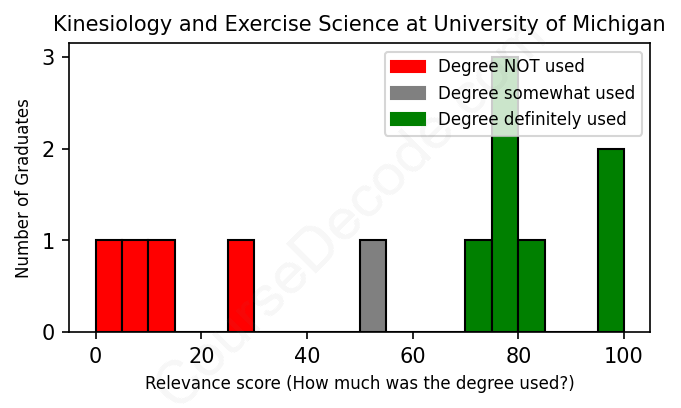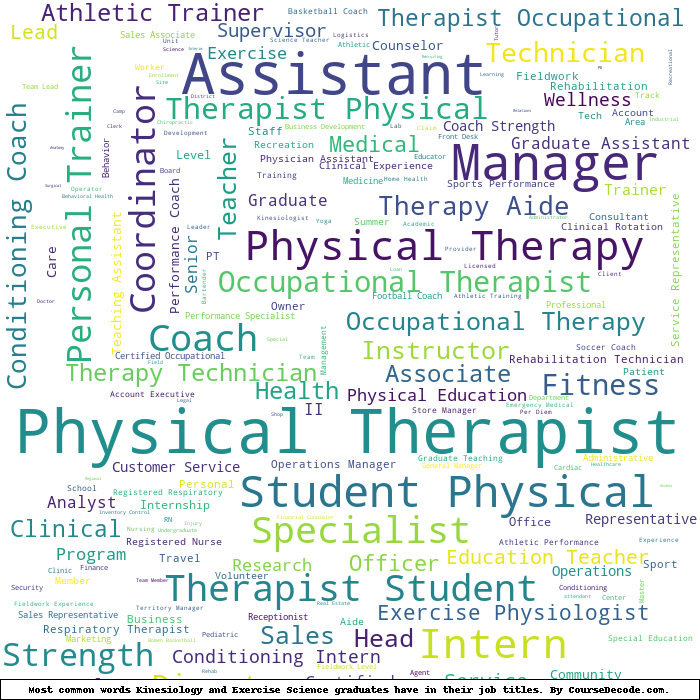
First, some facts. Of the Kinesiology and Exercise Science graduates from University of Michigan we've analyzed , here's how many have used (or NOT used) their degree in their career:

These are estimates based on AI analysis of 12 LinkedIn profiles (see below).
The verdict? Significantly below average. Overall, with an average relevance score of 56%, Kinesiology and Exercise Science graduates from University of Michigan have a much lower likelihood (-11%) of finding work in this field compared to the average graduate across all fields:
And for comparison, here's the chart for all profiles we've looked at across all degrees.
Also, after graduating, 41% of these graduates have pursued further education other than another Bachelor's degree (such as a Masters degree or other), compared to the average across all profiles of 35%. This suggests you may need more than just a Bachelors degree to be competitive as a Kinesiology and Exercise Science graduate.
See the details:
|
Relevance score: 77% We think this person has gone into a career highly relevant to their degree. We think this person has gone into a career highly relevant to their degree.
DEGREE INFOGraduated in 2014 from University of Michigan with a Bachelor of Science (B.S.) in Kinesiology and Exercise Science. No other secondary education since. JOB HISTORY SINCE GRADUATIONLifeguard Fuller Park Pool May 2014 - Aug 2014 Research Assistant  Michigan Institute for Clinical and Health Research May 2014 - May 2015 Coach  Club Wolverine Swimming Sep 2014 - May 2015 Physical Therapist  The Ohio State University Wexner Medical Center Aug 2018 - May 2021 Physical Therapist  CU Sports Medicine and Performance Center May 2021 - Jul 2022 Project Coordinator  Medpace Aug 2022 - Present ABOUTI am a doctoral trained, board-certified physical therapist with specialty in sports and orthopedics, seeking to continue expanding my career outside of the patient care space. I have transitioned into Clinical Research Project Coordination, and am motivated to grow into project management. I am a self-motivated, ambitious professional who thrives in ever-changing environments. I have spent my early career honing my skills in interdisciplinary relationship building, interpersonal communication, creating client buy-in, time-management, and organization. Creativity and adaptability have been at the forefront of my daily clinical tasks. I also have experience in leadership roles, which have positively impacted my communication and collaborative skills in a team environment. My organization and drive have made me successful in managing complex cases and successfully achieving, or surpassing, productivity demands while still producing high-quality work. I pride myself in my quality of work and feel most fulfilled when I have the opportunity to continue to progress my knowledge base with the evolving world of medical technology. I believe that medical science and technology are the answers to continuing to make the largest positive impact on global health, and I seek opportunities to continue to be a part of this evolution. I understand the success of clients and the overall success of a business is directly related to the quality and commitment of team. To truly succeed, it is crucial for all members to be able to not only lead, but to relate to their colleagues and their clients to build an understanding of each individual and their motivation styles and goals in order to create the highest quality outcomes. |
The top 10 most common jobs done by the graduates we've analyzed (ranked most common to least) are:
Based on the LinkedIn data, it looks like graduates from the University of Michigan with degrees in Kinesiology and Exercise Science tend to land a mix of jobs, with varying degrees of relevance to their field. Some of the most common roles are in health-related or fitness-oriented positions, such as health advisors, physical therapists, and coaches, which directly utilize the skills learned in their degree programs. However, there are also quite a few graduates who have veered into more administrative, marketing, or unrelated fields, which shows a split in career paths.
In general, while many of these job titles are indeed connected to Kinesiology and Exercise Science, a significant number don’t directly leverage the knowledge and skills gained during their studies. Roles like physical therapists, podiatrists, and research assistants are clearly in line with the curriculum and principles of their degree. On the flip side, positions in administration, sales, and marketing fall away from the core competencies, suggesting that while the degree provides a solid foundation, many graduates find themselves in careers that are not deeply relevant to their area of study. This highlights the versatility of a Kinesiology and Exercise Science degree, even if it doesn’t always lead to straightforward applications in the field."
Here is a visual representation of the most common words in job titles for Kinesiology and Exercise Science graduates (this is across all Kinesiology and Exercise Science graduates we've analyzed, not just those who went to University of Michigan):

Graduates from the Kinesiology and Exercise Science program at the University of Michigan seem to have a pretty diverse range of career trajectories. Right after graduating, many of them land jobs that are reasonably relevant to their field, such as health advisor roles, physical therapy aides, or coaching positions. For some, roles in research and clinical settings also seem to be common stepping stones as they gain experience and figure out where they want to specialize. It's not a surprise given the program’s focus, as many of these entry-level jobs aim to build foundational skills in health, wellness, and exercise science.
However, as we look at their careers a few years down the line, we see a mix of paths. While some have gone on to successful positions as physical therapists, podiatrists, or in clinical management, others have pivoted into roles that feel somewhat disconnected from their kinesiology roots. For example, graduates have ventured into marketing, digital media, and roles in large corporations that may not directly utilize their exercise science background. This suggests that while many graduates do end up in fulfilling careers related to their major, there's also a fair share who find themselves in fields that aren't as closely aligned with kinesiology or exercise science in the long run. So, while there are definitely success stories, the journey seems varied, with some graduates making detours into unrelated territories over the years.
Honestly, pursuing a Bachelor’s degree in Kinesiology and Exercise Science, particularly at a school like the University of Michigan, can be a bit of a mixed bag. It’s not exactly a walk in the park, but it’s not the most brutal major out there either. You’ll dive into some science-heavy courses like anatomy and physiology, which require a solid understanding of biology and chemistry, so if you struggle with those subjects, it might feel a bit challenging. But on the flip side, there are a lot of hands-on experiences and practical applications that make it super engaging, especially if you’re into sports or fitness. Overall, it tends to be more on the moderate side in terms of difficulty compared to other majors, but it really depends on your strengths and interests!
Most commonly, in the LinkedIn profiles we've looked at, it takes people 4 years to finish a Bachelor degree in Kinesiology and Exercise Science.
Looking at these graduates from the University of Michigan, it seems like their job paths have been pretty varied, with some landing good gigs that likely pay decently and others taking a bit of a winding road to find their footing. For example, the 2011 grad who went from appraisal coordination to a director role probably sees some sweet paychecks now, while the 2018 grad now working as a resident physician is likely pulling in a solid salary as well. However, some of them, like the 2014 grads who started as lifeguards and research assistants, might not be raking in the big bucks just yet, although they seem to have moved into more promising roles over time. Overall, it looks like a mixed bag—some are doing quite well financially while others are still climbing that ladder, but that's pretty normal in the job market!
Here is a visual representation of the most common words seen in the "about" section of LinkedIn profiles who have a Bachelor degree in Kinesiology and Exercise Science (this is across all Kinesiology and Exercise Science graduates we've analyzed, not just those who went to University of Michigan). This may or may not be useful:

Here are all colleges offering a Bachelor degree in Kinesiology and Exercise Science (ordered by the average relevance score of their Kinesiology and Exercise Science graduates, best to worst) where we have analyzed at least 10 of their graduates: